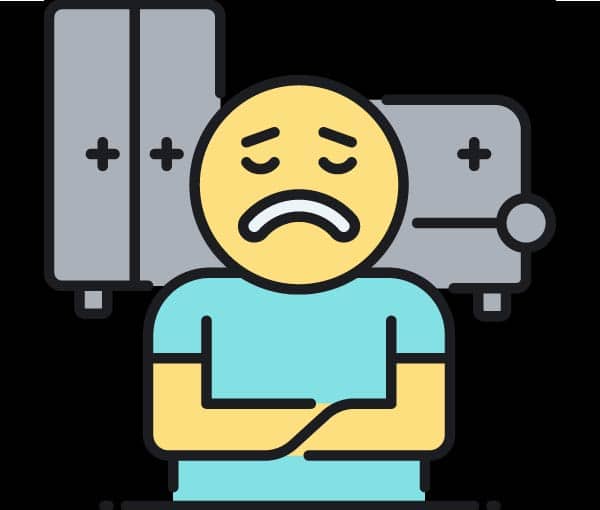Diogenes syndrome, also known as ‘severe domestic squalor,’ is a behavioral disorder characterized by excessive hoarding, a dirty living space, and inadequate personal hygiene due to poor self-care.
Typically, Diogenes syndrome manifests in an accumulation of unessential items over time – months or even years. Although this remains controllable in most individuals with the disorder, compulsive hoarding can evolve into a life-changing condition.
We can use the term ‘pack rats’ from the Merriam-Webster dictionary to describe individuals with Diogenes syndrome. They define the term ‘pack rats’ as:
A person who collects or hoards especially unneeded items.
Of course, they may seem unneeded to other people, but a person with Diogenes syndrome might be totally unaware that their home’s condition is worse than other people’s.
Diogenes syndrome typically comes in two forms: primary and secondary. Primary Diogenes is when the syndrome is present without any other mental health conditions. Secondary Diogenes is when the syndrome occurs in conjunction with one (or more) other mental health conditions. Mental health conditions may cause Diogenes in secondary cases.
‘Healthy’ Hoarding vs. Diogenes Syndrome
All of us like to collect seemingly unnecessary objects from time to time. Plus, most of us aren’t obsessed with being neat and clean, with our homes reaching a state of chaos on occasions – dishes piling up in the sink, hanging linens everywhere, half-opened moving boxes in every corner with various trinkets strewn across the floor – does this sound familiar to you?
However, there is a distinct difference between this form of ‘healthy’ hoarding and Diogenes syndrome.
In most individuals, messiness tends to be short-term. We may clean up, take some of our collected items to thrift stores, and so on. Whatever we do, we manage to restore order in our home environment without this developing into a behavioral disorder.
The Diagnostic and Statistical Manual of Mental Disorders (DSM-5) states that, for an individual to receive a diagnosis of Diogenes syndrome, they need to display:
- Excessive, abnormal cluttering of unnecessary, invaluable objects triggered by transient life situations.
- The individual is not sentimental about hoarded items
- An extreme difficulty letting go of possessions, resulting in an accumulation of clitter that compromises the individual’s living spaces.
- Poor insight – the individual may not be aware that they are experiencing Diogenes disorder, so it may not raise concerns.
Diogenes syndrome differs from hoarding disorder in that the latter experiences distress when they come to discard the items because of an emotional attachment to them. People with hoarding disorder also show extreme distress and impairment in many areas of functioning, including social and occupational.

So how do we recognize this disorder in our loved ones? And how do we avoid making it worse?
Symptoms of Diogenes Syndrome
Compulsive behaviors, such as those commonly associated with OCD, often come and go as phases in young adults, but persistent hoarding may be a severe sign of Diogenes syndrome.
Anyone can have Diogenes syndrome, regardless of gender, socioeconomic status, or age. That being said, cases of Diogenes syndrome are more common in older people than children. In almost everyone, the syndrome is either rooted in childhood experience or appears after a significant emotional shock.
Common Signs of Diogenes Syndrome
- Neglect of personal hygiene.
- Neglect of living space.
- An unhealthy accumulation of useless objects (magazines, trinkets, boxes, plastic bags, clothes, etc.). Things occupy the subject’s entire living space, blocking even the exits.
- Compulsive accumulation of garbage and even excrement in some cases (theirs or those of their pets).
- Social isolation and/or refusal to receive people at home.
- A state of denial: subjects are typically unaware of the state of the environment in which they live and believe everything is normal.
- Anger, resentment, or delusions of persecution when encouraged to clean up by their peers or loved ones.

In the most severe cases of Diogenes syndrome, disorder and lack of hygiene almost always result in the proliferation of insects, allergens, and mold in the living space.
What’s more, individuals with Diogenes syndrome are susceptible to illnesses like pneumonia, as well as falls, fires, and other accidents.
It may not be until a severe accident that people with Diogenes believe they have an illness. This often results in the “breaking point” that ultimately leads to an official diagnosis, pushing neighbors and loved ones to contact professionals for an intervention.
Is There a Typical Cause for Diogenes Syndrome?
As with most mental health disorders, Diogenes syndrome hasn’t been traced to a single or direct cause as of this writing. The study of mental health differs from virology, where specific bacterium or cellular activity can explain an infection.
However, there are accompanying factors that occur with Diogenes syndrome. In over 50% of cases, people with the tendency to hoard were noted even in childhood as indecisive individuals with an unusual attachment to objects and a penchant for collecting.

Risk Factors for Diogenes Syndrome
Diogenes syndrome is equally common in men and women. The onset of this behavioral disorder is uninfluenced by hereditary factors or socioeconomics, but research shows that it is most common in adults over 60 who live alone.
While the evidence for Diogenes syndrome is limited, we can gain an idea of the risk factors for this condition based on the findings for hoarding disorder. Evidence suggests that risk factors for hoarding behaviors are:
- Stressful or traumatic life experiences: Some individuals do not experience hoarding disorder or Diogenes syndrome until after experiencing a traumatic or stressful life event such as a family bereavement, divorce, eviction, or house fire.
- Family history of hoarding: Evidence suggests that hoarding disorder has a strong genetic association.
- Personality: Indecisiveness is a common temperament trait among people with obsessive hoarding behaviors.
What Do Hoarders Typically Accumulate?
Compulsive hoarders can accumulate various objects based on their sensibilities. The most common items are clothes, books, flyers, bills, boxes, food, and electronics.

In combination with one another, these accumulated items can begin to pose health risks over time.

What Are the Typical Health Risks of Obsessive Hoarding Behaviors?
There is a multitude of risks that can materialize even after a short period of compulsive hoarding. Many of these are influenced directly by the conditions and materials that make up the subject’s living space. The most common are fire risks, respiratory health problems, feelings of isolation, claustrophobia, mold buildup, and the emergence of vermin such as flies or rats.
Identifying Diogenes Syndrome in Family Members & Loved Ones
It’s often difficult to realize that a person suffers from Diogenes syndrome, as they may appear harmlessly aloof at first. Their issues are usually brushed off as pack rat behavior. In most cases, Diogenes syndrome is discovered by chance – when a neighbor complains of odors to the landlord or during routine inspections by the fire department, for example.
When a person is diagnosed, they are very often in a state of denial about the problematic nature of their disorder. Most often, specialized counselors and professionals will be needed to discard accumulated, stockpiled objects. Individuals with Diogenes syndrome may need treatment in a psychiatric facility to change their hoarding habits.
It’s necessary to employ tact and gentleness when helping someone with Diogenes syndrome. A brusque or forceful intervention can sink these people into depression, substance abuse, or neurotic behavior.
Helping Family Members & Loved Ones Avoid Diogenes Syndrome
Often, we can get ahead of Diogenes syndrome in family members and loved ones by encouraging healthy behaviors around possessions when they’re younger. These tactics also work for individuals with Diogenes later in life.
- Unclutter your home in phases: one room at a time, one closet at a time.
- Proceed in small periods of 20-30 minutes each day rather than procrastinating until the end of the week, when it’s more likely to feel like a single massive chore.
- Get rid of all clothes, shoes, and personal items you haven’t worn for a year or more.
- For utensils and dishes, a good idea is to put everything in a big box before putting them back in the cupboard individually. In 2-3 weeks, you’ll be able to identify what is useful to you, while the rest is already sitting in a box and ready for disposal.
- Sort your bills and documents as you receive them; avoid letting anything pile up on tables and desks.
- Put things away after using them.
- Can You Do Hypnotherapy Online? - March 12, 2023
- Beyond Pack-Rat:Hoarding Disorder and Diogenes syndrome - December 14, 2022
- Asperger’s Syndrome in Adults - November 14, 2022

